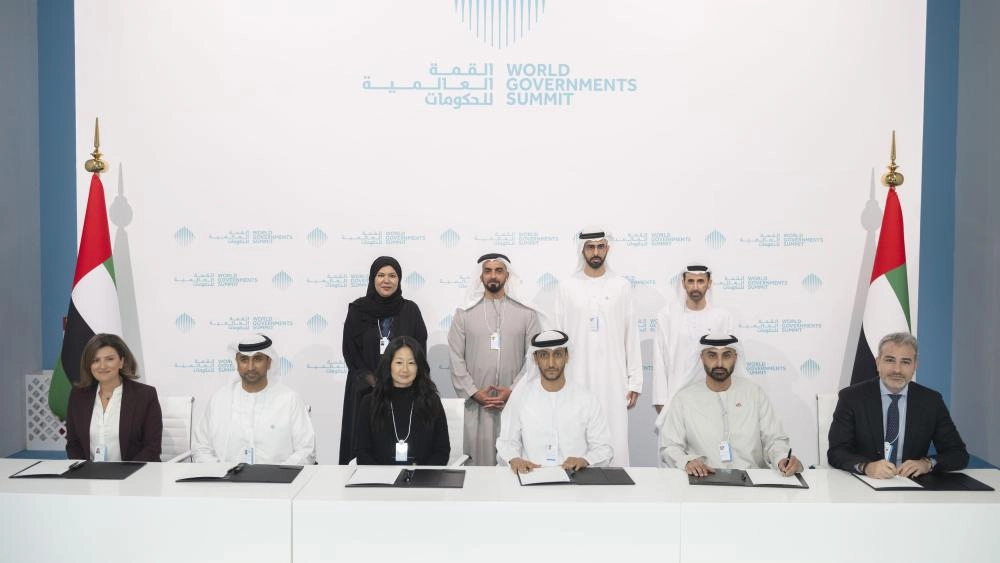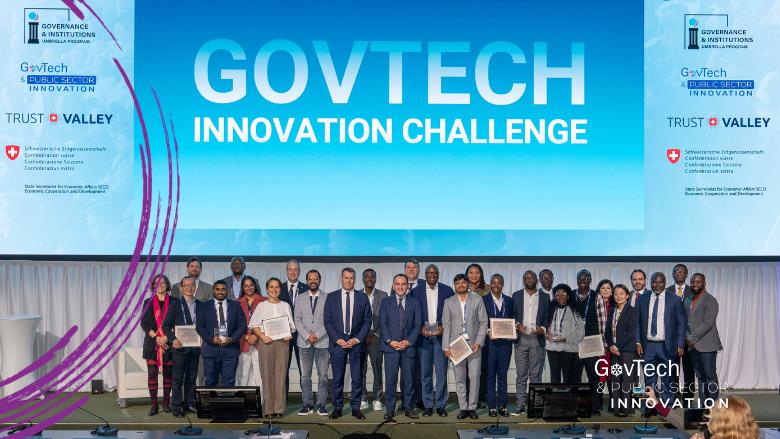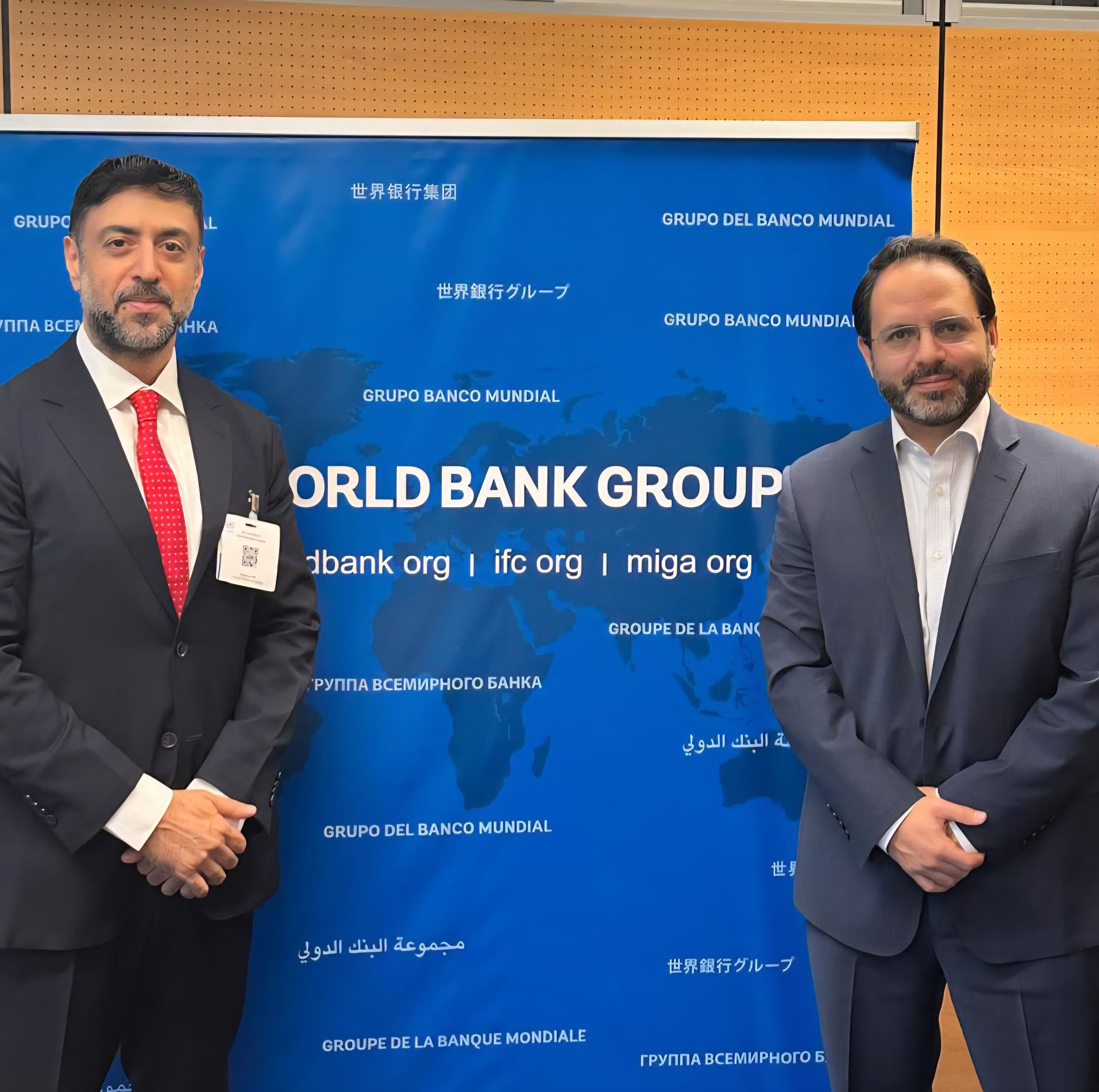Dubai, February 12, 2025 – WAM
H.H. Lt. General Sheikh Saif bin Zayed Al Nahyan, Deputy Prime Minister, Minister of Interior, and Chairman of the UAE Council for Digital Wellbeing; Omar Sultan Al Olama, Minister of State for Artificial Intelligence, Digital Economy, and Remote Work Applications; and Sana bint Mohammed Suhail, Minister of Family Affairs and Director-General of the Abu Dhabi Early Childhood Authority, witnessed the signing of the Children’s Digital Wellbeing Charter in the UAE. The signing ceremony took place on the sidelines of the World Government Summit in Dubai, in line with the Year of Community.
This charter, the first of its kind in the region, focuses on strengthening partnerships between the public and private sectors to ensure a safe and balanced digital environment for children and families. It establishes the foundations for joint cooperation in developing policies and initiatives that enhance digital wellbeing. It also represents a pioneering step towards empowering younger generations to benefit from digital opportunities safely and responsibly, in line with the aspirations of the wise leadership for a sustainable and prosperous digital future.
The charter, which brings together several government and private sector entities under the leadership of the UAE Council for Digital Wellbeing and the Abu Dhabi Early Childhood Authority, aims to enhance children’s online safety, provide a safe and appropriate digital environment, limit children’s exposure to harmful content, and ensure respect for and protection of children’s rights in the digital environment. This is achieved by strengthening cooperation between various partners, focusing on cybersecurity and protecting children from cyberbullying.
Lieutenant General His Highness Sheikh Saif bin Zayed Al Nahyan stated that protecting children in the digital world is a shared responsibility that requires concerted efforts across various sectors to ensure the provision of an online space that balances freedom of access to information and ensuring the safety of young people from online risks. With the increasing reliance on technology in daily life, it has become imperative to establish clear frameworks and effective implementation mechanisms to protect children from harmful content and growing digital challenges. This is embodied in this charter, which establishes the principle of sustainable partnership between government entities, the private sector, and technology companies to enhance cybersecurity for children and develop smart solutions to protect them from digital risks. His Highness affirmed that signing the Children’s Digital Wellbeing Charter falls within the framework of national efforts aimed at fostering a safe and balanced environment for children in the digital space, in line with the directives of the wise leadership aimed at building a sustainable digital society that takes into account the needs of future generations and provides them with opportunities to learn, grow, and innovate in an environment that respects their rights and safeguards their safety. His Highness noted that the UAE is always keen to anticipate the future and develop strategies that keep pace with accelerating technological changes.

His Highness added that the Children’s Digital Wellbeing Charter reflects this commitment by unifying efforts to ensure a safe digital environment that respects children’s privacy, protects them from unsafe data use, and provides them with interactive platforms that stimulate creativity and learning, away from the negative influences of the digital world.
This charter is being organized in coordination between the UAE Council for Digital Wellbeing and the Abu Dhabi Early Childhood Authority, in strategic partnership with the International Affairs Office at the Ministry of Interior, the Telecommunications Regulatory Authority and the Digital Government, and the Office of Artificial Intelligence, Digital Economy, and Remote Work Applications. It also includes the membership of several technology, content, and social media platforms, as well as internet and telecommunications service providers in the country, including Snapchat (a pioneer member for the first year), Meta, Google, TikTok, X, Yango, Samsung, E&, and du. For his part, His Highness Sheikh Theyab bin Mohammed bin Zayed Al Nahyan, Chairman of the Martyrs’ Families and Development Affairs Office at the Presidential Court and Chairman of the Abu Dhabi Early Childhood Authority, said, “Protecting children and enhancing their quality of digital life is one of the UAE’s top priorities. Ensuring the safety and protection of children in the digital world directly contributes to building a safe and prosperous society that benefits positively from technology, as it is one of the essential tools that enhances children’s learning and skill development. By providing a safe and stimulating digital environment that allows them to access information and educational resources in a safe and healthy manner, we guarantee them greater opportunities to learn and innovate, away from the risks that may result from the misuse of technology.” Jawaher Abdel Hamid, Head of Public Policy for the Middle East and Africa at Snap, said, “At Snap, we have a significant responsibility to continually strive to provide a safe experience for our users, especially young people and adolescents. As a reflection of this commitment, we are proud to play a leading role in developing and implementing the UAE’s first Children’s Digital Wellbeing Charter. We look forward to actively collaborating with governments, partners, and parents to prioritize the safety and privacy of Snap users in the UAE and contribute to enhancing children’s digital wellbeing.”

The world today is witnessing increasing threats to children’s online safety and well-being. Studies indicate that spending more than two hours a day in front of screens increases their likelihood of developing high blood pressure and type 2 diabetes. Statistics from 2019 also showed that approximately 33% of children in the UAE were exposed to cyberbullying, highlighting the urgent need to raise awareness of the dangers of the digital space and take measures to protect children.
The Charter will contribute to strengthening cooperation between various partners to ensure the highest standards of digital safety for children, by establishing clear mechanisms to protect children from physical and psychological harm and enhancing supervision of digital content directed at them. The Charter also commits to protecting children’s data and ensuring their privacy and security within the digital ecosystem, while promoting transparency through reporting and continuous evaluation mechanisms in accordance with international best practices.
It will also focus on developing effective strategies to limit the promotion of harmful content, taking into account different age groups, in addition to supporting digital literacy programs and educational initiatives that equip children and their parents with the necessary skills for safe browsing.
The Charter will also promote the principle of ongoing partnership between relevant stakeholders, enabling the exchange of expertise and investment in research and development to keep pace with the risks emerging from technological developments. The agreement will enhance cooperation in exchanging information on advanced technological methods that contribute to providing a safer online environment for children. This includes developing and using effective tools to verify a user’s age before viewing content; developing best practices and strategies to enhance user privacy protection, with a particular focus on children’s data; ensuring full compliance with relevant data protection regulations; defining incident response mechanisms and reporting protocols to address emerging cyber threats and manage incidents affecting children immediately; encouraging participation in long-term research and development initiatives; promoting innovation and continuous improvement in strategies related to digital well-being; and enhancing collaborative efforts in developing policies aimed at enhancing children’s digital well-being.











